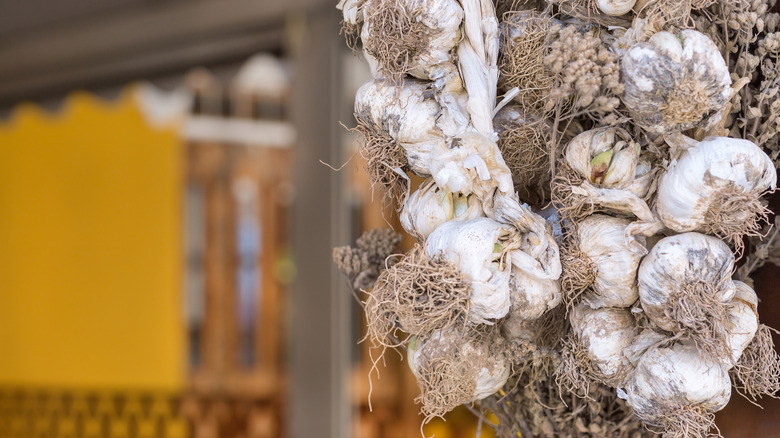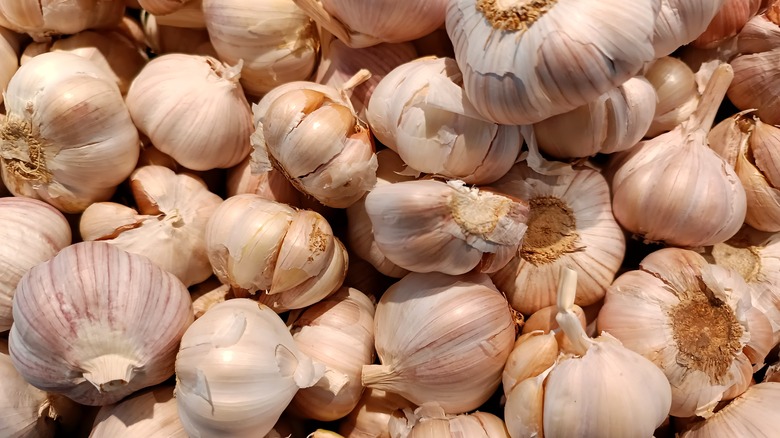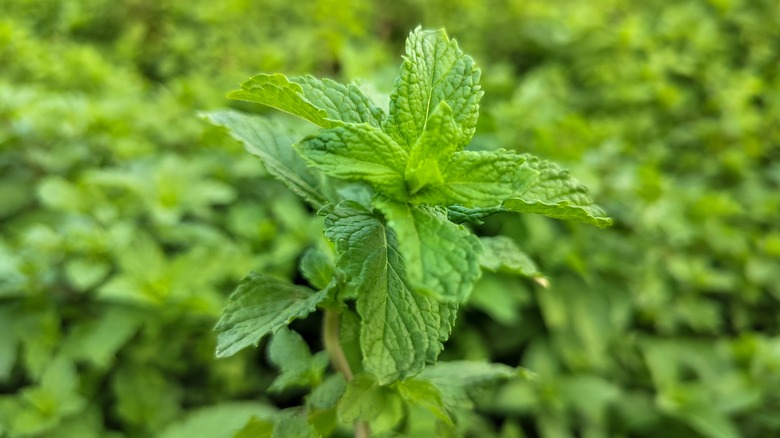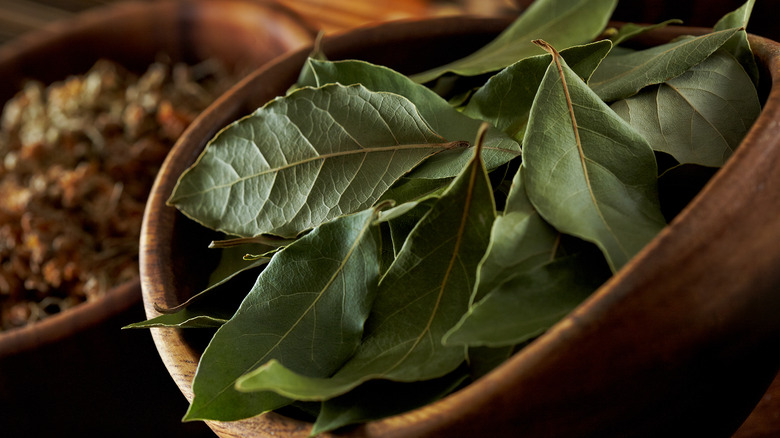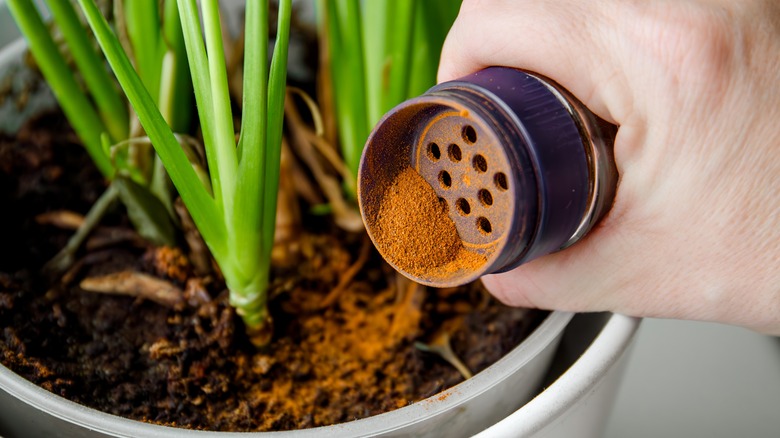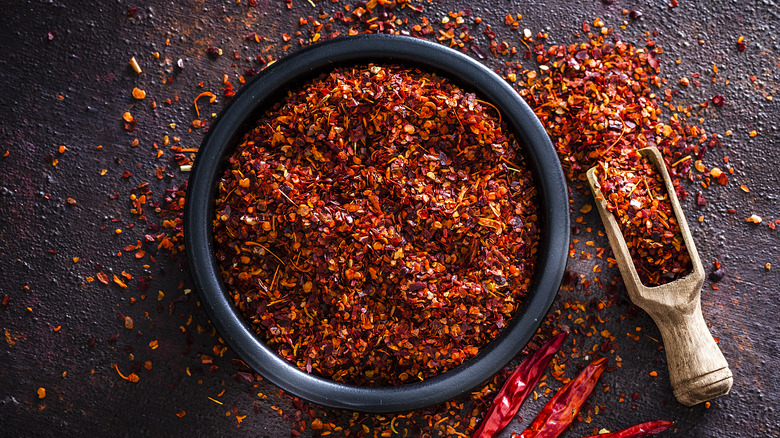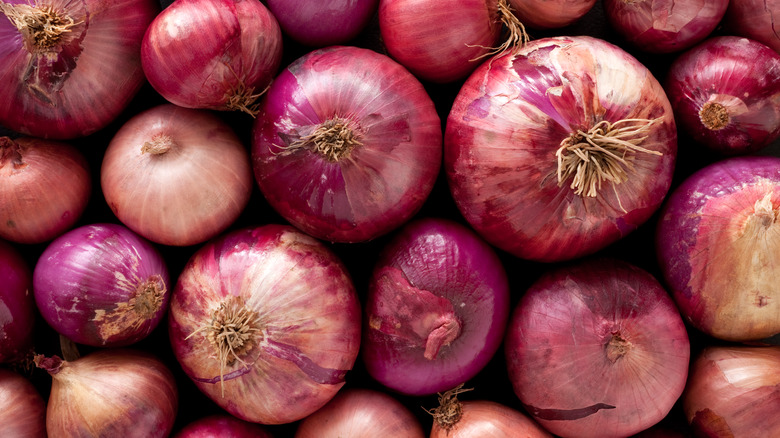10 Unexpected Ingredients To Place On Your Patio To Repel Pests
Patios attract various pests, especially when you're dining, entertaining, or if you keep plants on the deck. Commercially sold pesticides can be quite effective at repelling insects and rodents. However, they're not always safe for you and your family. You don't want to enjoy meals, host guests, or relax in a space treated with chemical-based poisons. Luckily, there are plenty of natural household ingredients that repel unwanted insects and critters well without putting your health at risk.
Below, we've curated a list of some widely used kitchen and pantry items that boast surprising pest control superpowers. We didn't base our lineup on old wives' tales, either. Each of these natural pesticides is packed with compounds that are scientifically proven to repel or destroy mosquitoes, flies, aphids, small rodents, and other common outdoor pests. And the best part is that these staples are perfectly safe for you and your patio plants.
Orange peels overwhelm insects' respiratory systems
Orange peels usually find themselves in garbage cans once the owner removes them from the juicy fruit. That's a waste — these citrusy skins have a number of uses, among which is the ability to drive insects away from your patio. Orange peels' insecticidal and insect-repellent properties stem from the limonene content in their oil glands. Limonene is a monoterpene, a hydrocarbon-based compound found in numerous plant oils. According to the EPA, limonene is commonly used in commercial pesticides and insecticides. It works by damaging the insects' respiratory systems when sprayed on the insects directly. However, a 2019 study by the Oriental Journal Of Chemistry found that limonene derived directly from orange peels is an effective insect repellent, too. This latest discovery means you can use orange peels to keep insects away, not only kill them.
The great thing about orange peels is that their insect-repellent properties are complemented by vibrant, attractive aesthetics. This visual appeal affords several placement options around your patio plants. For example, you can simply disperse the peels in parts of your patio that attract insects, such as water features, sources of light, or plants. Alternatively, you can pile the peels into bowls that complement their orange color (glass, white, and black will work great!) and leave the bowls on your patio tables. You can even stuff the peels into gauze bags (the kind you'd use with potpourri) and suspend them from the ceiling of your gazebo — this way, the peels will repel insects from the nearby light source. Regardless of the placement method, the peels will wither away over time and should be replaced with fresh peels.
Coffee grounds' scent repels mosquitoes
Two in three Americans make coffee at home every day, so coffee grounds are a pantry staple in many households. But while most people find the coffee aroma irresistible, a number of insect types are repelled by its presence. This repellent effect of coffee grounds stems from the caffeine content. Caffeine is a type of methylxanthine, a compound that inhibits phosphodiesterase enzymes. This process enables caffeine to disrupt insects' life cycles, and this ability is documented in scientific studies. For example, according to a study by the National Library of Medicine, coffee grounds added to the breeding habitat of Aedes albopictus mosquitoes (which transmit diseases like Dengue, Zika, and chikungunya) harm their reproductive cycle. Likewise, a study recorded in the Annals of Medical Entomology (via CABI Digital Library) showed that coffee grounds kill the larvae of the Ochlerotatus mosquitoes. It's not just mosquitoes that coffee grounds can repel — you can also use them to ward off flies and keep spiders from building webs on your patio.
Since coffee grounds aren't cheap, you may be reluctant to use them for anything other than brewing coffee. But even used grounds contain enough caffeine to be an effective natural insecticide. However, as the studies referenced above showed, the grounds are most effective at killing insect larvae, especially when the caffeine is concentrated in the surrounding water. The best way to use coffee grounds on your patio is to add them to the problem areas — spots where they will stop the insects from reproducing. Any water features or low-lying parts of the garden where water accumulates are the ideal locations. That said, you can also place used grounds strategically around your patio — in bowls, jars, or saucers — and their aroma will help keep mosquitoes away. You can even burn the grounds, and the smoke will serve as a protective barrier between you and the pests.
Banana peels deter aphids
Banana peels are commonly discarded scraps that can serve a dual purpose in your outdoor oasis — they keep out herbivorous insects and fertilize your garden. Banana peels repel insects that feed on the plants in your garden, such as aphids. The tannin content of the peels damages the insects' organisms when ingested, and its bitter taste drives the pests away. Likewise, the alkaloids found in the peels are a potent feeding deterrent to moth larvae according to the Arthropod Plant Interact study (via the National Library of Medicine). Meanwhile, a research paper based on a study by the University of Gujrat in Pakistan states that banana peels were effective at killing off aphids in wheat fields. This observation shows that the peels are an insecticide as well as a repelling agent. However, the same study also found that banana peels significantly boosted plant growth. This is not surprising given that the peels have a large store of potassium, which is a nutritious plant fertilizer.
You can use banana peels to swart aphid outbreaks and keep other insects away from your outdoor plants in several ways. An easy yet effective method is to place the peels around the plants — they will function as a barrier between your vegetation and aphids and other creepy crawlies. That said, the peels do attract fruit flies, so it's best not to leave them exposed on your patio. Instead, water or mist plants close to your outdoor seating or dining areas with a banana peel-infused liquid. You can create a liquid insecticide by simply soaking the peels in water for several days.
Garlic keeps insects away from plants
Garlic is an extensively used culinary ingredient with a number of medicinal uses and one unappealing aspect — the stinky breath it causes, especially when consumed raw. But the same compound that causes garlic breath — allicin — can also protect your patio plants against several insects. Allicin is a biologically active compound that quickly degrades when the garlic tissue is crushed or submerged in a liquid. As it degrades, allicin transforms into diallyl sulfide, which is toxic to insects such as the red flour beetle (Tribolium. castaneum), the maize weevil (Sitophilus zeamais), the mealworm beetle (Tenebrio molitor), and house flies. Apart from its ability to harm and kill insects, allicin is also a repellent, according to a 2017 study (via the National Library of Medicine).
An effective way to harness garlic's insecticidal properties is to create a garlic-infused watering mixture for your patio plants. The plants ingest the water along with the insect-repelling compounds through transpiration, which enables their leaves and stems to repel pests. To prepare the mixture, crush several garlic cloves, then mince or blend them, and finally mix them with water. Let the mixture sit for a few days, then use it to water your plants. That said, note that the garlic mixture will inevitably give off a strong pungent odor, so be mindful of this when you use it to treat patio plants before entertaining guests.
Mint can repel insects and mice
Any amateur chef or mixologist would be thrilled to have a few mint plants in their garden, as this common herb is indispensable in numerous dishes and cocktails. But there's another way mint can be helpful when you host alfresco meals and cocktail parties out on the deck. Thanks to its menthol content, mint can drive away ticks, flies, mosquitos, and even mice. Menthol is a kind of terpene alcohol that's naturally present in mint and gives the herb its unique, refreshing taste and scent. It's also a biocidal compound that acts as a strong fumigant. Since the Middle Ages, mint has been used as a rodent repellent. In a far more recent 2023 study by the Molecules journal (via the National Library of Medicine), researchers found that peppermint essential oil was highly toxic to aphids and interfered with the development of Colorado potato beetle larvae.
To turn mint into a powerful pest repellent, you'll need to extract as much of its menthol as possible. That's because most of the mint's fumigant and biocidal properties have been observed when using its essential oil to treat areas susceptible to pest infestations. To create such a mix, you can chop some peppermint, boil it in water, and use it to spray your outdoor plants once the liquid has cooled. Alternatively, the University of Hawaii has an easy recipe that uses peppermint essential oil instead of fresh mint leaves. The recipe suggests adding two teaspoons of peppermint essential oil to a gallon of warm water, along with two tablespoons of liquid soap, to create the insecticidal mixture. And if you want to use mint to keep rodents such as moles away from your patio plants, you can simply plant mint bushes around your garden. Just note that mint is an invasive species and is toxic to dogs and cats.
Bay leaf powder is an effective natural insecticide
Bay leaves are a common ingredient in soups, stews, and pickling marinades, to which they add a light, refreshing flavor. This flavor comes from eucalyptol, a key active compound found in the leaves that's also an effective natural insect repellent. The compound's insecticidal properties are well-documented. For example, a 1987 study appearing in the Journal of Chemical Ecology (via the National Library of Medicine) found that eucalyptol was effective at deterring Aedes aegypti mosquitoes (the ones that cause Dengue fever) from feeding and laying eggs. Likewise, a research paper by the Iranian Journal of Public Health (via the National Library of Medicine) notes the powerful repelling effect of Eucalyptol against mosquitoes. Moreover, a study published in 2021 by the Botany Letters journal (via ResearchGate) observed that eucalyptol harms flour beetles at various stages of their life cycle.
If you live in hardiness zones 8-10, you can plant a bay laurel tree on your property and scatter fresh leaves around your garden and patio. But if you can't get ahold of fresh bay leaves, don't fret — the dried ones work just as well as they still retain the eucalyptol essential oils. You can simply place the dried leaves next to your garden and patio plants to keep pests away. Alternatively, grind the leaves into a powder, then sprinkle them around the plants, flower beds, and even on top of your patio deck boards. If you have pets, be careful — bay laurel is toxic to cats and dogs.
Cinnamon can ward off ants and gnats
Cinnamon is commonly used to give desserts and beverages a holiday flavor, but this beloved spice is less popular among the ants and gnats trying to invade your patio. Its strong aroma is a mighty repelling agent thanks to its source — the Trans-cinnamaldehyde compound found in cinnamon bark. A 2022 article in the Food Packaging and Shelf Life journal (via ScienceDirect) claims that Trans-cinnamaldehyde was proven an effective repellent against Plodia interpunctella moths. At the same time, a 2021 study in the Molecules journal (via the National Library of Medicine) showed cinnamaldehyde and other cinnamon constituents (like eugenol and anethol) are effective insecticide and repellent agents. These compounds killed mosquito larvae and drove away mosquitoes, moths, and aphids during various laboratory tests.
At home, you can use cinnamon to prevent insects from invading your patio and destroying your plants. Add ground cinnamon or crushed cinnamon sticks to the soil of your patio plants to prevent gnat infestations. Likewise, cinnamon powder can help you keep ants away from your deck — just apply it along the insects' paths or around their hills. And if you want to ward off hungry mosquitoes while out on your patio, add cinnamon sticks to your fire pit or inside an incense holder and the smoke will keep the insects away.
Cayenne pepper drives away mosquitoes, bugs, and critters
Cayenne pepper is used to add heat to numerous dishes and is scientifically recognized for its medicinal properties. But this widely-used spice is also a robust insecticide, rodenticide, and insect repellent — all thanks to its capsaicin content. According to the National Pesticide Information Center, capsaicin has several serious physiological effects on insects, such as damage to the membranes and the nervous system. These effects can kill the insects, but the mere presence and scent of capsaicin is enough to send the pests packing. The compound is effective at warding off rodent infestations, too. It binds to rodents' TRPV1 receptors and leads to the inflammation of the peripheral and central nervous systems. This painful experience quickly teaches the pests to avoid capsaicin by staying away from treated areas.
Whether you want to keep insects or mice away from your patio, cayenne pepper is a simple and effective pest control tool. All you need to do is disperse some cayenne pepper powder on and around your patio plants. You can also sprinkle it around the perimeter of your deck if you know that pests often hide beneath it. That said, this tactic may put your kids or pets at risk of temporary discomfort if they come in contact with the pepper powder. Likewise, wash your own hands well with soap and keep them away from your eyes after handling the substance.
Vinegar diverts ants from your patio
Vinegar is a widely used cooking ingredient and cleaning agent, but it also offers an excellent natural way to protect your patio from ants. That's because vinegar's main active component, acetic acid, produces a powerful scent that disrupts ants' ability to navigate. Ants leave pheromones in their path to guide other ants in a specific direction. According to Yale Pest Control, vinegar applied to ants' paths prevents them from sensing the pheromones. Consequently, the insects lose their orientation and head back to the colony.
Using vinegar to keep ants off your deck takes little effort. Western Exterminator advises a simple solution comprising equal parts water and white vinegar. Spray the mixture onto your patio, and be sure to target known ant paths — these should be easy to spot since ants like to walk in a single file. You should soon notice that the ants are no longer marching along their established paths. That said, the vinegar solution stops working as soon as the smell of acetic acid dissipates, at which point the ants can return and re-establish their routes. So, apply the solution frequently to keep the pests at bay.
Onion odor is repulsive to most pests
Onions make you cry because of the sulfur they release when you cut them. Sulfur also makes onions effective at driving pests away from your outdoor garden. That's because the sulfuric compounds are highly irritating to various small mammals and lethal to insects, according to the National Pesticide Information Center. Onions also contain allicin — the same compound that gives garlic its insect-deterrent powers. Thanks to the combination of sulfur and allicin, onions are both an insecticide and a repellent agent.
To release sulfur and allicin from onions in sufficient quantities for pest control, you'll need to cut them. You can then place onion slices inside the pots housing your patio plants or distribute them around your flower beds. Likewise, you can hang sliced onions from your gazebo ceiling in mesh bags or by tying them directly to threads — just note that doing so will infuse your entire patio with an oniony smell.
